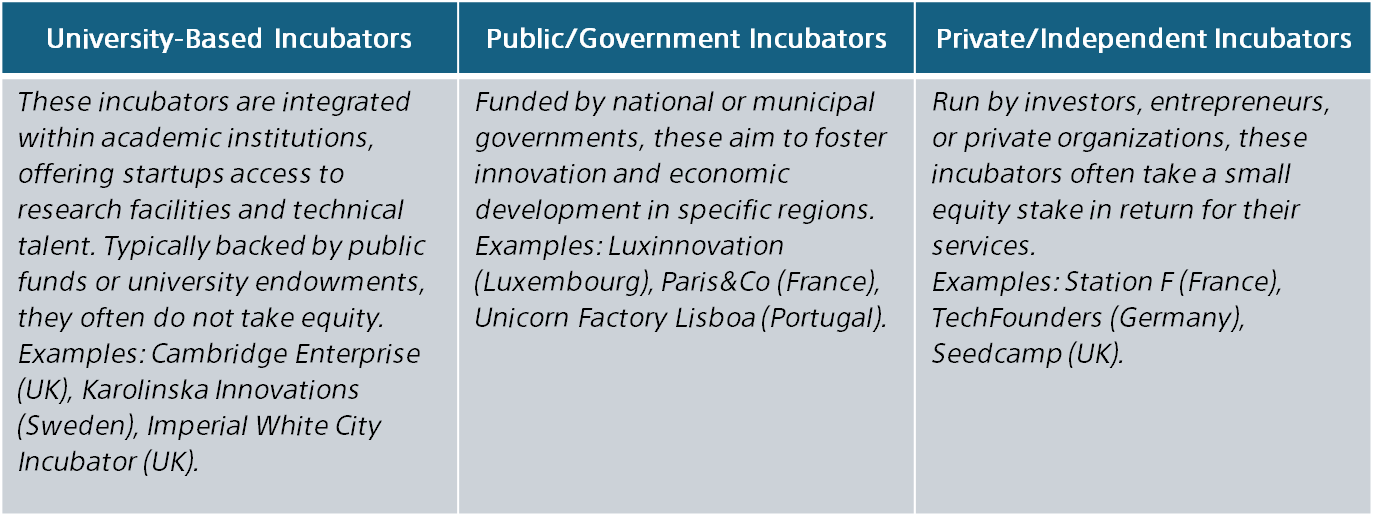Sony Acceleration Platformは、スウェーデンのルンドにも拠点があり、ヨーロッパを中心に世界の事業開発に挑戦するあらゆる企業の皆様を支援しています。
本連載「北欧に学ぶ!イノベーションレポート」では、北欧のイノベーション文化に気軽に触れていただけるよう、Sony Acceleration Platformヨーロッパ拠点のメンバーからのレポートを全編英語でお届けします。
ヨーロッパの次なる10 億ドル規模のスタートアップはどこで生まれるのでしょうか?
最先端のAIプラットフォームから生物分解性プラスチックの先駆者まで、ヨーロッパのインキュベーターを深く掘り下げることで、欧州で最も刺激的なベンチャー企業の原動力が明らかになります。これらのプログラムがどのように機能し、誰が資金を提供しているのか、そして東京からシリコンバレーまで世界の投資家がなぜ欧州に注目するのか、その理由を見ていきましょう。

<Part I> Europe’s Innovation Hotbeds: Incubators Powering the Next Tech Giants
At Sony Acceleration Platform Europe, we’re excited to bring you the first of a two-part series exploring the startup incubator landscape across Europe. In this introductory article, we’ll explain what incubators are, how they are typically financed, and provide real examples of successful incubator programs throughout the region.
What is a Startup Incubator?
A startup incubator is a program or facility designed to support early-stage companies by offering resources and services to help them succeed. These often include:
- Physical space – Startups often lack affordable workspaces in their early days. Incubators provide shared office space, co-working areas and in some cases, specialized lab facilities. This helps keep overhead costs low while ensuring access to professional infrastructure.
- Mentorship – One of the most valuable aspects of an incubator is direct access to experienced entrepreneurs, investors and business coaches. These mentors can help with strategic planning, product development, market entry and team-building—critical areas that are often make-or-break for startups.
- Access to funding – Many incubators have close ties to venture capital firms, angel investors, and government grant programs. They help startups prepare for fundraising and often host demo days or pitch events to connect startups with potential backers.
- Business support services – Administrative tasks such as accounting, legal compliance, intellectual property protection, and HR management can overwhelm early teams. Incubators often provide in-house support or discounted partnerships with professionals to ease this burden.
- Education and training – From intensive bootcamps to targeted workshops, incubators offer hands-on training tailored to the needs of founders. Topics range from go-to-market strategy and customer discovery to financial modeling and scaling operations.
But beyond tangible services, incubators play an equally important role in building community. Entrepreneurship can be a lonely journey and being surrounded by other founders can be deeply motivating and informative. Incubators foster an atmosphere of mutual support, where startups learn from one another, share resources and in many cases, collaborate on real projects.
This network effect often leads to synergies: for example, one startup in the incubator may handle IT infrastructure for others, while another provides design, marketing, or recruitment services. These interactions create a dynamic and efficient ecosystem where startups grow not only from mentorship, but from one another.
In short, incubators are more than just a place to work; they cultivate lasting connections between entrepreneurs, investors, researchers and mentors.

How Are Incubators Financed?
Most incubators rely heavily on public funding, especially in their early stages. This aligns with their core mission of supporting startups that may lack the collateral or revenue needed to access traditional financing.
Over time, successful incubators diversify their revenue streams by offering value-added services or taking equity stakes in promising ventures. Some also receive support from major EU programs like the European Institute of Innovation and Technology (EIT), which invests in high-potential innovation ecosystems across the continent.
According to EU research:
- 24% of incubators are publicly funded
- 38% are private
- 28% are hybrid (semi-public/private partnerships)
Incubator Spotlights
Station F (France)
Located in Paris and launched in 2017 by French entrepreneur Xavier Niel, Station F is the world’s largest startup campus. Housing over 1,000 startups and supported by partners like Meta and Microsoft, Station F offers more than 30 startup programs under one roof.
One of its standout alumni is Hugging Face, a platform powering the open-source machine learning community. In May 2025, the company raised $235 million, bringing its valuation to over $4 billion USD.
Imperial White City Incubator (UK)
Operated by Imperial College London, this incubator specializes in deep-tech, life sciences, and biotech startups. The facility gives companies access to high-spec laboratories and academic expertise.
A notable success story is Polymateria, which develops biodegradable plastics that leave behind no microplastics. In late 2024, they secured $25 million in funding, with a valuation just under $200 million USD.
Sony Acceleration Platform Europe visited this incubator during our London tour in June 2025, including the nearby Sir Michael Uren Hub.
Unicorn Factory Lisboa (Portugal)
Formed by the Lisbon municipality in 2022 by merging several local initiatives, Unicorn Factory Lisboa has quickly grown into one of Europe’s top 10 startup hubs (Financial Times, 2024).
Since its earlier days as Startup Lisboa, it has supported more than 800 startups, which together have raised over $1 billion. One rising company is Universal Cover, a digital platform helping companies manage compensation and benefits. At its last funding round, it was valued at $40 million USD.
Stay tuned for Part II of this series, where we’ll continue our journey through Europe’s dynamic startup landscape and explore additional incubators driving innovation across the continent.
In the meantime, if you’re curious about how the Sony Acceleration Platform connects with these innovative ecosystems or how your organization could benefit from similar collaborations - please don’t hesitate to get in touch!

いかがでしたか?
ヨーロッパに学ぶイノベーション文化の醸成に関して、貴社向けの講義の実施や支援のご相談を希望される場合には、以下のフォームよりお問い合わせください。

